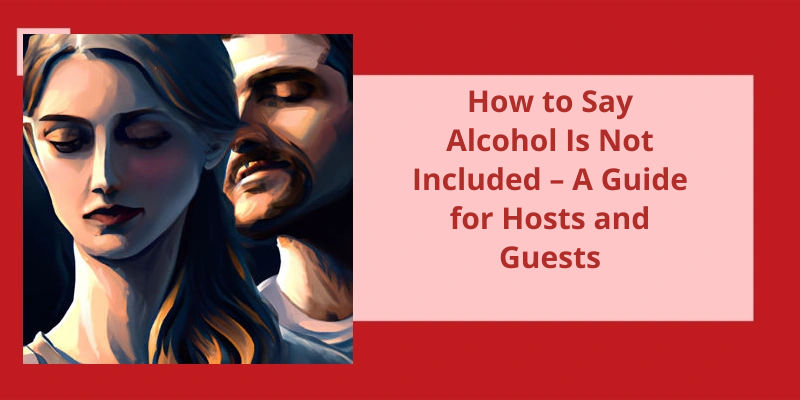Alcohol, despite being a popular social lubricant, can be quite damaging to one's health, relationships, and overall well-being. Whether it's due to a personal choice, religion, or a health issue, some individuals may feel uncomfortable with consuming alcohol in social situations. However, it can be challenging to turn down an offer to drink without offending or appearing rude to those around you. The good news is, there are subtle and effective ways to say "no" to alcohol while still enjoying the company of others. In this article, we'll explore some tips on how to navigate social situations where alcohol is present, from being honest about your reasons for not drinking to finding ways to keep yourself engaged without a drink in hand. So, let's dive in!
How Do You Say Alcohol on an Invitation?
When it comes to inviting people to a party where alcohol is going to be served, there are a number of different ways to approach the situation. Some hosts may choose to mention alcohol explicitly on the invitation, while others may opt for more subtle language that hints at the presence of alcohol without being too direct.
Regardless of how explicitly or subtly alcohol information is presented on a party invitation, it’s important to be mindful of the potential consequences of overindulgence. Guests who choose to consume alcohol should do so responsibly, and hosts can help encourage safe behavior by providing non-alcoholic drink options, monitoring alcohol consumption, and ensuring that partygoers have a safe way to get home after the event is over.
Ultimately, the goal should be to create an environment in which guests feel comfortable and safe, regardless of their individual preferences and choices around alcohol consumption.
So, you’re planning a party and want to avoid the hassle and cost of providing alcohol for all of your guests? One easy solution is to let them know ahead of time that they should bring their own. But how do you convey this politely without sounding like a cheapskate? Well, the old acronym “BYOB” still does the job! In this article, we’ll give you some tips on how to tactfully communicate your BYOB expectations to your guests, and ensure that your party is a success without breaking the bank.
How Do You Tell Guests to Bring Their Own Alcohol?
When hosting a party, it can be expensive to provide all the alcohol for your guests, especially if you’ve a large number of attendees. Thats why it’s perfectly acceptable to request that they bring their own alcohol. Thankfully, it’s not a difficult task to communicate this expectation to your guests.
One simple way to let your guests know that they should bring their own alcohol is to include the initials “BYOB” on the invitation. This code is well-known and understood, so you don’t have to worry about confusing your guests by using an obscure abbreviation.
It’s important to note that BYOB parties arent just for college students or those hosting wild, raucous events. Hosting a BYOB event is a great way to save on expenses and cater to your guests individual tastes. It also relieves you of the responsibility of managing a bar, keeping alcohol flowing, and ensuring that everyone is properly served.
If the thought of asking your guests to provide their own alcohol makes you feel uneasy, consider offering other refreshments or hosting a potluck-style event. This way, guests can bring a dish to share in addition to their alcohol contribution. This can help reduce the financial burden on the host while still ensuring that everyone has a good time.
Including this request in your invitations is a simple and effective way to communicate your expectations to your guests. Just remember to create a safe environment, make sure everyone is aware of the rules, and enjoy your event!
Source: How do you say BYOB politely?..
When it comes to discussing alcohol consumption with someone, it can be a sensitive topic that requires tact and understanding. While there are various approaches that can be taken, being honest and transparent can often be the best way to go about it. This can involve sharing personal experiences or reasons for not drinking, such as those outlined below.
How Do You Tell Someone Not to Drink Alcohol?
” These are just a few examples, but it’s important to remember that how you approach the topic will depend largely on your relationship with the individual, the situation, and their personal reasons for drinking.
One approach is to simply be honest and direct, saying something like, “I don’t drink and I’d prefer it if you didnt either when were together.”. This approach requires clear communication and a willingness to stick to your boundaries. It may also require some explanation as to why you don’t drink if the person is curious or pushy.
Another approach is to deflect the situation altogether. You could suggest alternative activities that don’t involve drinking, like going for a hike, seeing a movie, or playing video games. This approach requires that you’re creative and proactive about suggesting fun alternatives.
It’s important to remember that not drinking is a personal choice and may be influenced by a variety of factors including religious or cultural beliefs, health reasons, personal history with alcohol, or simply a preference for sober activities. Whatever the reasons may be, it’s important to respect those choices in yourself and others.
If youre concerned about someones drinking habits or believe they may have a problem with alcohol, it’s important to approach the topic with compassion and understanding. Avoid judgmental language or accusations and instead express your concerns in a non-threatening manner.
Ultimately, the decision to not drink or to confront someone about their drinking habits is a personal one and should be made with care and consideration. Whatever your approach may be, it’s important to prioritize open communication, honesty, and respect for yourself and others.
It’s understandable to want to have an alcohol-free wedding, whether it’s due to personal beliefs or to maintain a family-friendly atmosphere. However, informing guests of this decision can be a delicate task.
How Do You Tell Guests No Alcohol at a Wedding?
Alternatively, consider providing alternative beverages for guests who may not be comfortable or interested in drinking alcohol. Offer a variety of non-alcoholic options such as sparkling water, juices, and mocktails. This can help to create a festive atmosphere while still respecting the wishes of the couple and their families. Additionally, consider providing snacks and refreshments throughout the event to keep guests satisfied and content.
If you do feel compelled to give more detailed explanations for why alcohol won’t be served at the wedding, you can include a brief statement on the invitation or wedding website. This could be something as simple as “As a matter of personal choice, we’ve decided not to serve alcohol at our wedding. Thank you for your understanding.”. This can help to convey the decision with tact and without making guests feel singled out or uncomfortable.
Another option is to speak with guests directly if they inquire about alcohol at the wedding. It’s important to be respectful and understanding of guests who may have different preferences or cultural norms, while also standing firm in the couple’s decision.
Planning an alcohol-free wedding may also require some creative thinking when it comes to entertaining guests. Consider providing other types of entertainment such as games or activities, music, or even a photobooth to keep guests engaged and having fun. Additionally, make sure to plan the wedding at a time of day where guests will be comfortable and have plenty of energy, such as earlier in the day or at a time that accommodates their schedules.
By taking these factors into consideration, couples can create a truly inclusive and memorable wedding experience for all attendees.
Pros and Cons of Serving Alcohol at a Wedding
Serving alcohol at a wedding can add to the celebratory atmosphere, but it can also lead to some potential downsides such as increased costs, potential liability for the hosts, and possible overindulgence by guests.
Conclusion
In conclusion, learning to say no to alcohol can be challenging, but it’s essential to understand that it’s okay not to drink. Honesty about your reasons for not drinking should be the first thing on your mind, followed by preparing a generic excuse or pretending to drink with a mocktail. Letting the bartender know you're not drinking and changing the subject is also essential. Keeping your hands busy and using the excuse of being on medications or a diet can also come in handy. The key takeaway is to understand that it’s your choice not to drink, and you don’t have to justify your decision to anyone. Remember, being confident and assertive in your decision sends a strong message, and respecting others' choices to drink or not to drink should always be encouraged.






